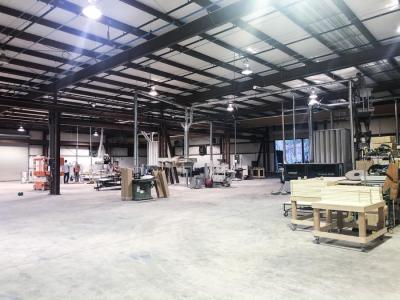Hellman-Chang moved to rural Georgia
Hellman-Chang just moved from Brooklyn to rural Georgia.
Here’s why
By Fred Nicolaus
As Ol’ Blue Eyes sang of his beloved New York: “If I can make it there, I'll make it anywhere.” Luxury furniture makers Hellman-Chang have been doing the former—now they’re trying the latter. Starting this month, co-founders Dan Hellman and Eric Chang are moving their business from a production facility in a hipstery corner of Brooklyn to a slightly less-cosmopolitan destination: Dawsonville, Georgia (population 3,000).
The move, Chang tells Business of Home, was long overdue. “Honestly, we were probably two years too late,” he says. The company has been growing steadily, roughly 15 percent to 20 percent annually, since Chang and Hellman began building furniture together in 2005. “We found out that as our sales were growing, our capabilities started to get choked. There were a lot of pain points that we were experiencing within our company, and we ultimately decided that we needed more square footage.”

Chang and Hellman quickly encountered an all-too-familiar problem for New Yorkers in search of more space: There isn’t any. After briefly looking at North Carolina, they finally settled on a 32,000-square-foot former food-testing facility in rural Georgia. (In an effort to attract manufacturers, Dawsonville offers attractive financing to companies willing to make the move.) Hellman has already made the move and will be overseeing the factory’s operations. Though the partners relocated two senior employees from their current workshop, they parted ways with most of their former staff; instead, they are hiring a local team in Georgia, tapping into the area’s population of skilled cabinetmakers. Chang, meanwhile, will keep an office open in Brooklyn to oversee sales, design and marketing.
Hellman-Chang's former Brooklyn workshop Courtesy of Hellman-Chang
As part of a desire to move smart, not just big, Chang and Hellman hired consultants to help them oversee their new production line. Interestingly, the resulting analysis suggested that one of the most important uses of their newfound empty space would be to keep it empty. “We didn’t realize that the constraint of our [space in Brooklyn] wasn’t that we couldn’t get a new machine. It was actually the ability to have empty space for work in progress,” says Chang. “In the old space, if we had a large bed to do or a big dining table, it would require taking up two to three benches. It may require the opportunity cost of not starting another project concurrently.”

Hellman-Chang's new Georgia workshop Courtesy of Hellman-Chang



